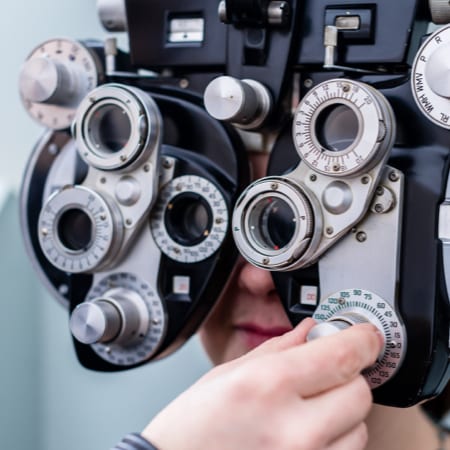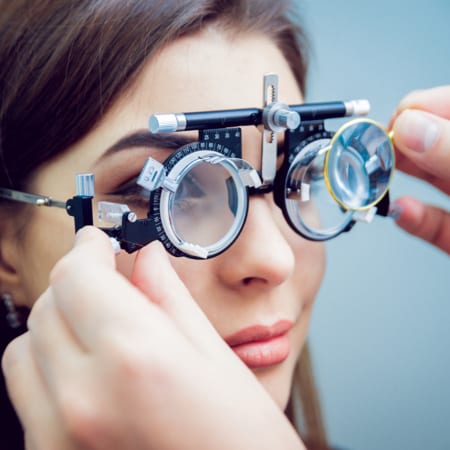Have you noticed a blurred or shadowy spot in the centre of your vision, or wavy lines on the page? These can be early signs of age-related macular degeneration (AMD), a common condition that affects central sight. Knowing what to watch for can help you act early to protect your vision for the future.
The earliest signs of macular degeneration often include blurry central vision, distorted straight lines, and difficulty seeing in low light. At Erie Shores Eyecare, we believe that providing clear information helps you make confident decisions about your eye health. Our team at the AMD Centre of Excellence is here to help you understand what to look for and how we can support you and your family.
Early AMD Signs to Watch For
AMD can develop slowly, so the initial signs might be easy to overlook. You could notice small changes that don’t seem like a big deal at first. Being aware of these indicators can help you seek support sooner.
Changes to Your Central Vision
Your central vision is what you rely on for sharp, detailed sight directly in front of you. An early sign of AMD can be a blurry, fuzzy, or shadowy spot in the middle of what you’re looking at. You might also find that you need brighter light than usual to see clearly for tasks like reading.
Wavy or Distorted Lines
Another key indicator is when straight lines appear bent, crooked, or wavy. You might notice this when looking at a door frame, a telephone pole, or the lines on a piece of paper. This visual distortion, a key symptom of age-related macular degeneration, is an important sign to discuss with your eye doctor.
Other Subtle Vision Changes
You may also experience a few other changes that could be related to AMD. Keep an eye out for these signs:
- Colours may seem less bright or faded than they used to.
- You might find it harder to adjust to dimly lit rooms.
- A small blind spot may appear and seem to grow in the centre of your vision.
Family History & Other AMD Risk Factors
Certain factors can increase a person’s chances of developing AMD. Knowing your personal risk profile is a great step toward proactive eye care. Your family’s health background is a particularly important piece of the puzzle.
How Your Family History Can Play a Role
If a parent, sibling, or child has AMD, your own risk can be higher, as research shows that macular degeneration is hereditary in many cases. This is why we encourage you to share your family’s eye health history with us. An optometrist can use this information to create a personalized screening and monitoring plan for you.
Lifestyle & Environmental Factors
Beyond genetics, a few other factors can play a role in your risk for AMD. People over the age of 50 are more commonly affected. Other considerations include lifestyle choices, as smoking harms the eyes and increases your risk, along with high blood pressure and a diet that lacks certain nutrients found in leafy greens and fish.
A Comprehensive AMD Assessment at Our Eye Clinics
Regular adult and senior eye exams are a fundamental way to detect AMD—often before you notice any symptoms at all. We use specific diagnostic tools to get a clear look at the health of your macula. This type of screening is a key part of our approach to eye disease management.
Advanced Imaging for Early Detection
Our clinics use technology that captures detailed images of the back of your eye. This gives us a clear view of your retina and macula, helping us spot the earliest signs of change. This detailed assessment helps us track your eye health over time with great care.
What to Expect During Your Exam
An AMD assessment is a simple and comfortable part of your comprehensive eye exam. When you visit our Leamington or Essex clinics, you can expect a warm welcome and a team ready to address your eye care needs. We will explain each step of the process so you feel informed and at ease.

Managing AMD & Supporting Your Vision
If we find signs of AMD, we are here to walk you through what comes next. As an AMD Centre of Excellence, our team has dedicated experience in managing this condition. Our goal is to provide helpful eye care services that prioritize your well-being and enhance your quality of life.
Personalized Treatment Plans
Several options are available to help manage AMD and support your vision. We can discuss lifestyle adjustments, nutritional supplements, and other strategies tailored to your needs. Your plan will be based on the type and stage of your condition.
Exploring MacuMira Treatment Options
For certain types of dry AMD, we can offer information on innovative options like MacuMira treatment. We will take the time to answer all your questions and explore the best approaches for your specific needs.
Everyday Steps to Protect Your Sight
You can take simple steps every day to support your long-term eye health. Building healthy habits is an important part of learning how to prevent macular degeneration or slow its progress. These small, consistent actions can make a real difference over time.
Vision-Friendly Nutrition
A diet filled with eye-friendly nutrients can support your macula. Try to include dark, leafy greens like spinach and kale in your meals. Fish high in omega-3 fatty acids—such as salmon and tuna—can also be beneficial for your retinal health.
Protective Eyewear & UV Safety
Protecting your eyes from the sun’s ultraviolet (UV) radiation is always a good idea, as repeated exposure can lead to serious UV damage to your vision. Wear sunglasses that offer 100% UVA and UVB protection whenever you are outside, even on cloudy days. This simple habit helps shield the sensitive tissues inside your eyes from potential damage.
Protect Your Sight with an AMD Eye Exam at Erie Shores Eyecare
Early detection is the key to slowing AMD and protecting your central vision. Regular eye exams can reveal changes long before you notice symptoms, giving you more options to manage your eye health. Taking action early helps preserve not only your sight but also your ability to enjoy the daily activities you love like reading, driving, and recognizing the faces of family and friends.
At Erie Shores Eyecare, we take the time to explain each step of your visit so you feel informed and supported. Our welcoming team combines advanced retinal imaging with personalized care plans tailored to your needs and risk factors. We’re here to guide you through your options and answer your questions every step of the way.Book your AMD screening or comprehensive eye exam at our Leamington or Essex clinic today and take the first step toward protecting your central vision for years to come.

















